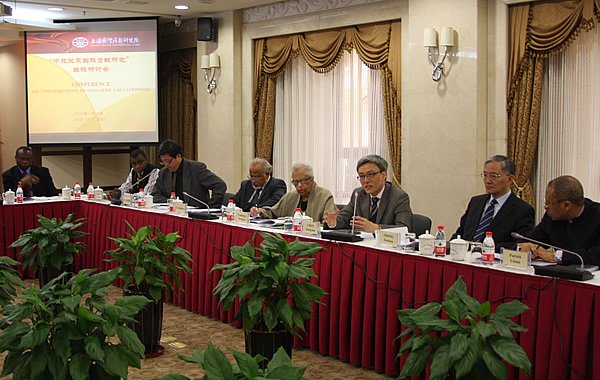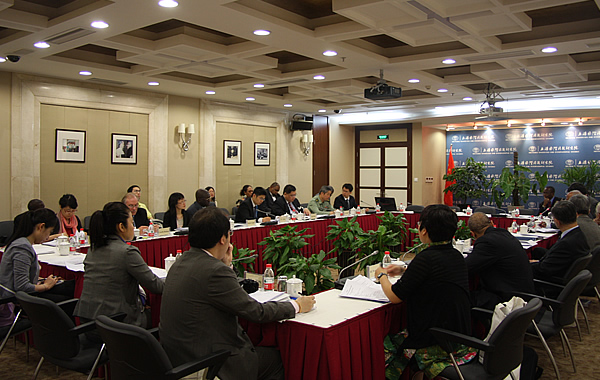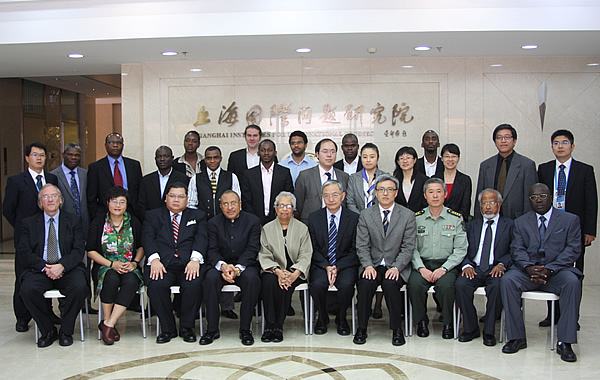SIIS holds the International Conference on Contributions of Sino-Africa Relationship



2016/09/10 read:498
May 18, SIIS holds the “International Conference on Contributions of Sino-Africa Relationship”. More than 20 scholars and officials from China, DR Congo, Egypt, Ethiopia, Guinéenne, Nigeria, South Africa and the US participate the conference and have a deep discussion about the physical, strategic and intellectual implications of Sino-Africa relations as well as its future development. SIIS Vice President Chen Dongxiao delivers the opening remarks. Amb. Zhong Jianhua, Chinese Government"s Special Envoy on African Affairs delivers the closing remarks. H. E. Constance B. Newman, former United States Assistant Secretary of State for African Affairs delivers the keynote speech.



On the China-Africa partnership
EDITOR"S note:
China-Africa ties have expanded in recent years. Trade has grown rapidly and Chinese investment in Africa has gained momentum.
However, some Westerners have viewed China"s involvement in Africa in a critical light, accusing it of plundering the continent"s resources.
Shanghai Daily reporter Ni Tao talked to Constance Newman, former US Assistant Secretary of State for African Affairs and authority on development, about these issues last week at the Shanghai Institutes for International Studies (SIIS).
Q: What are the differences between Sino-African cooperation and Africa-West cooperation?
A: What I should first start out by saying is that China and the United States are the two largest contributors to development in Africa.
China has the largest trade with the continent. I think in 2010 the trade level was US$150 billion. And there is now US$2 to 3 billion in Chinese development assistance.
The US is the largest development assistance partner, at about US$30 billion a year. So they are contributors but contribute in different ways.
Another difference is that the US normally has conditions on grants and loans, having to do with governance and human rights. China on the other hand has an almost philosophical opposition to conditionality on the money going in.
There is also a difference in the nature of the projects. China is more inclined to fund infrastructure. The US funds more of the softer needs, training and technical assistance and developing farming cooperatives. That is not to say that China doesn"t do some of that, but the US does very little infrastructure. I think they actually complement one another.
Q: How does Sino-African cooperation redefine South-South cooperation and contribute to global development?
A: I"m a big supporter of South-South projects and strategy because there might be greater understanding of what the issues are if a part of the world has or has had similar issues.
None of this should be exclusive, however. China"s contribution as a partner of South-South cooperation is extremely important. But I would not be at all comfortable if someone suggests that it"s the only way Africa should receive its financial support. It"s one of the ways.
Q: Having worked with various aid bodies, you are experienced in development issues. What are the current constraints of global development?
A: Looking at the statistics of what"s going on in Africa, based on what the African Union says, many African countries are still at the bottom of most measures.
One question I"m concerned with, in regards to working with Africa as a partner, is what is it that we are doing right and what is it that we are not doing right? How can those numbers be better?
I can read you some statistics compiled by the African Union. Thirty-four African countries are among the 50 least developed countries on the bottom of UN life quality measure. A third of Africans in Sub-Sahara are under-fed and 40 percent live in conditions of poverty.
Unless the lives of the people are improved, the fact that the governments and businesses are happy, and that my country and China are seeing greater imports isn"t the answer. There has to be some greater analysis of what needs to be done to improve the lives of the people.
And one thing that I appreciate China does and we do also is work with the African Union and regional economic communities, because in the end they know more about what should be done.
That"s been one of the problems of development strategy in the past. There"s been too much imposition from the outside about what needs to be done, and it"s the people themselves who know what needs to be done. But it"s a combination of what people say are priorities and ours from the donor-investor world.
We say, let us share with you some experiences from other parts of world. You want to go that way or not, that"s fine.
But it ought to be a partnership where both share information, analyze what"s best and in the end both benefit in some way for having worked together.
Q: In what areas can China make a bigger difference in Africa?
A: I think it"s one tough question that can be answered only by the African leadership.
We know what the education, health and environmental problems are.
We could say more money ought to go to education. But if it doesn"t fit in terms of sequence and the amount, and if it doesn"t fit with what Africans believe should be done, it"s probably not going to work.
As a matter of fact, the infrastructure needs to be improved. You are not going to get major investment if roads don"t exist, information technology doesn"t exist and the electricity goes out every other hour. That should be the highest priority, in my opinion.
But perhaps the African Union or one of the regional economic communities would say you need to invest more in education so that once you put the infrastructure in, you will have people to maintain it. Maybe that"s true.
But during my career, I found that it"s very hard to get businesspeople looking at the bottom line to take the risks where they know infrastructure doesn"t exist. They can go to other places where there is infrastructure and make money.
I still am not going to say that"s what China ought to be doing more now, but I"m very happy that China is involved in infrastructure.
Q: Some Western pundits have occasionally labeled China a neo-colonialist in Africa, which China rejects. What do you think?
A: I don"t agree with the press in saying China is a neo-colonial power.
Most serious people I have dealt with in development aren"t really saying that.
Where that"s coming from is often the media and people who have a superficial understanding of what"s going on in Africa.
And it"s easy to conclude that China is there for the natural resources unless you go behind where the money"s actually going and the combination of partnerships China is having with Africa. And then you won"t say that.
It"s a problem that we have anyway in terms of superficial understanding of what"s going on in Africa. Our media almost never says anything positive. It"s easy for them to say words like neo-colonial power.
They throw that out and move on, and don"t have to know anything else.
Q: Many African leaders have turned their backs on laissez-faire free market principles. Does it signal the demise of the Washington Consensus on the continent?
A: I think we all need to be careful in making assertions. We have an expression, throwing the baby out with the bath water.
The Washington Consensus on how the economy should work includes principles on fiscal responsibility. There should be fair taxation of businesses. You won"t oppose that. There are certain parts of the Washington Consensus that make sense.
And when I say don"t throw the baby out with the bath water, that means you look at each of those principles and see if it"s something that ought to continue.
Many of them ought to continue. While many African countries have already tried to have their governments running their businesses and parastatals, I think we all need to be careful not to take a major shift from where everybody is now to some philosophical new place.
Q: Chinese exports to Africa sometimes may have displaced certain local businesses and a few Chinese firms in Africa are not necessarily good corporate citizens. Will these challenges grow to an extent that harms Sino-African collaboration?
A: I don"t think so. I think it is a case-by-case problem. If China doesn"t sit down with its partners in countries where it has an image problem and figure out how to solve the problem, it can multiply.
Source: http://www.shanghaidaily.com/nsp/Opinion/2012/05/23/On%2Bthe%2BChinaAfrica%2Bpartnership/
